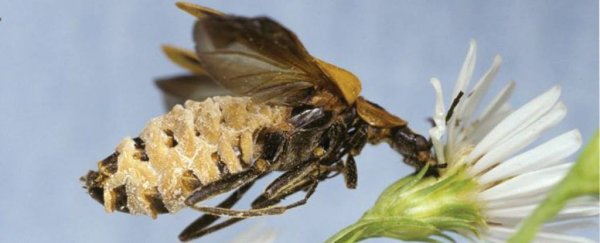Here's a small word of advice; if you happen to be an adult beetle on the lookout for a date, you might want to start with a conversation before getting hot and heavy.
New research has described how a parasitic fungus called Eryniopsis lampyridarum becomes an STI from Hell by killing its host and then spreading its spores onto other beetles that try to mate with its corpse.
Over the past 20 years, entomologists from the University of Arkansas and Cornell University in the US have been collecting a mix of living and dead goldenrod soldier beetles (Chauliognathus pensylvanicus) from various places across the US in order to get a closer look at how the parasitic fungus affected their bodies.
The parasite E. lampyridarum isn't new to science, nor is its impact of forcing its host's jaws to clamp onto a plant before it dies and then pushing the corpse's wings open to expose its spores to the air.
But a number of things still aren't clear about the mechanisms behind the fungus's zombie-like takeover, or the reasons behind it, prompting the researchers to analyse the gruesome process in more detail.
Of the 446 specimens they collected, a fifth of male and female beetles had been infected with the fungus, forcing most of them to strike a pose of hard outer casings open, wings spread wide, showing off a plump, spore-speckled abdomen.
Two of the dead beetles were studied over a number of hours to measure the growth of the fungus and development of its spores. While their wings remains closed at first, 15 to 22 hours later they unfolded, coinciding with the appearance of the fungus's fruiting bodies.
Part of this timing could have something to do with giving the spores the best conditions for survival.
"Production of condiophores and conidia in the dark early morning hours may benefit survival of fungal conidia because the relative humidity is usually higher then," the researchers write in their report.
The lifting of the wings also appears to be the result of the growing fungus increasing pressure inside the insect.
While it's possible the behaviour simply lets the spores float off to find new hapless beetles to infect, the researchers now think there might be another benefit.
"Alternatively, we theorise that the role of the wing spreading may stimulate mating behaviour or increase some other behavioural interaction resulting in uninfected beetles crawling on infected beetles where they pick up conidia and become infected," the researchers write.
The goldenrod soldier beetle feeds on a variety of flowers, which also happens to be where they find their respective mates.
So it's not hard to imagine an infected beetle clamping down, dying, exposing its sexy, swollen abdomen, only to have another passing goldenrod soldier beetle brush over it as it either feeds or mates.
Or, if it's a horror story you're after …
"This would be like a person infected with a virus, who deliberately sought out a singles bar, grabbed hold of the bar with their teeth, and died there, where healthy humans would be exposed to infective virus particles," lead researcher Donald Steinkraus from the University of Arkansas told Richa Malhotra at New Scientist.
Because nature is always more horrific when you think of animals as people.
Just think of all of those other mind-controlling, zombie-making parasites out there, like worms that make fish more cautious (until they're ready to be eaten), amoeba that make mice more fearless in front of cats, or fungi that make ants march up plants before turning their corpses into art nouveau.
But maybe we're getting ahead of ourselves – there's still some work to be done to demonstrate the fungus benefits from turning the beetle into a swipe-right on Tinder.
Shelley Adamo at Dalhousie University, who wasn't involved in the research, also explained to New Scientist that a number of insects adopt striking "death poses" after being infected, meaning it isn't necessarily an adaptation by the parasite.
"A good test to do in the future would be to glue the wings shut, as well as remove them altogether and test whether that affects infectivity," Adamo explained.
In the meantime, if you do happen to be a goldenrod soldier beetle reading ScienceAlert, our advice remains the same – always check prospective mates for a pulse. Just in case.
This research was published in the Journal of Invertebrate Pathology.
